As a professional bird enthusiast, I’ve always been fascinated by their complex behaviors and unique senses. One day, while watching a flock of sparrows in my backyard, I wondered what could keep them away. This question led me to discover what birds hate.
Birds are smart and adaptable, living in many environments. They have natural reactions to certain things that we can use to keep them away. For example, some smells and the presence of predators can scare them off. Knowing what birds hate helps us keep them out of unwanted areas.
Key Takeaways
- Birds can be deterred by various means, including smells, sounds, and the presence of predators.
- Effective bird deterrents must target the birds’ natural aversions and instincts.
- Understanding what birds hate is crucial for developing successful strategies to keep them away from desired areas.
- This article will explore the smells that birds dislike, the limitations of home remedies, the proven repellents that birds hate, and long-term solutions for bird control.
- Integrating a multi-faceted approach is often the most effective way to deter unwanted bird behavior.
Can Birds Smell?
Many think birds don’t have a good sense of smell, but research shows they do. They can smell a lot, like food and their own droppings. This bird sense of smell helps them find food, make nests, and behave in certain ways.
Birds’ Remarkable Sense of Smell
Studies show that birds’ olfactory abilities are much better than we thought. Birds like seabirds, waterfowl, and raptors can smell many different odors. This helps them live in their environment.
Detecting Smells of Food and Nesting Areas
Birds use their smell to find food and pick the right places to nest. They can smell ripe fruits, find insects, and know when their droppings mean a good spot for nesting.
“Birds can use their sense of smell to find ripe fruits, detect the presence of insects, and even identify the scent of their own species’ droppings, which can indicate the availability of nesting materials or potential breeding grounds.”
This knowledge is key for managing birds. It means using certain smells can help keep birds away from places they shouldn’t be.
What Smells Are Birds Attracted To?
Birds have a strong sense of smell. They are drawn to certain smells that help them survive and stay healthy. Knowing what smells attract birds is key to controlling their numbers.
The Allure of Bird Droppings and Nests
Birds like the smells from their own droppings and nests. These smells signal a safe spot for other birds to come. The bird poop smell is a strong bird attractant, bringing more birds to the area.
The Smell of Food
The smell of food can also draw birds. Even if it’s not food for humans, the bird pheromones and the scent of potential bird nesting behavior attract them. This is a big issue near garbage cans or compost piles.
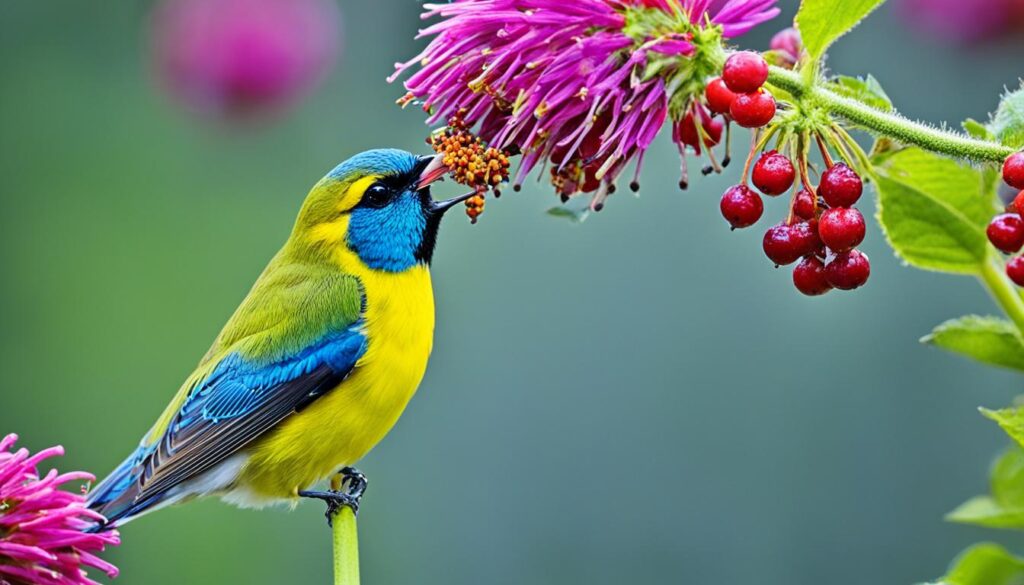
“Birds can identify one another through their scent and may decide on a mate based on smell.”
Knowing what attracts birds is key to keeping them away in certain areas. This helps in finding effective bird deterrents.
Home Remedies to Repel Birds
Many homeowners use natural, homemade remedies to keep birds away. These homemade bird repellents and natural bird deterrents can be made with common household items. Ingredients like essential oils for bird control, chili pepper bird repellent, and peppermint bird deterrent are often used.
Apple Cider Vinegar and Essential Oils
A DIY spray made with apple cider vinegar and essential oils like peppermint or citronella is popular. These ingredients have a strong, unpleasant smell that can keep birds away. But, this method might not work well because the scent can fade or need to be reapplied often.
Chili Peppers and Peppermint
Using chili pepper and peppermint is another way to deter birds. Mix crushed chili peppers or peppermint oil with water and spray it in gardens or on roofs. Birds don’t like the spicy and minty smells, so they’ll avoid those areas.
“While these natural bird deterrents can help, they might not work well over time. It’s hard to keep the right amount and frequency to keep birds away.”
Homemade bird repellents can be a good choice because they’re affordable and eco-friendly. But, they might not always work well. If they don’t help, you might need to look into professional services or commercial products to keep birds away.
Limitations of Home Remedies
Homemade bird repellents can offer some short-term relief but often don’t work well over time. It’s hard for homeowners to get the right mix of natural ingredients like essential oils or chili peppers. This makes it tough to create a strong smell that keeps birds away.
Difficulty in Achieving Effective Concentrations
One big issue with home remedies is mixing the right amount of active ingredients. Mixing essential oils or spices in the correct proportions is tricky. Without special equipment and knowledge, it’s hard to find the best mix to deter birds.
Need for Frequent Reapplication
Natural bird deterrents can lose their strength over time. These home remedies often need to be reapplied to work. This makes them a time-consuming and possibly not very effective way to control birds. The challenges with natural bird deterrents and the need for frequent reapplication of DIY bird deterrents can be frustrating for homeowners looking for a reliable solution.
While home remedies for birds may help at first, their limitations in achieving effective concentrations and the requirement for frequent reapplication make them a less than perfect solution. Looking into more dependable and lasting options might be needed for effective and sustainable bird control.
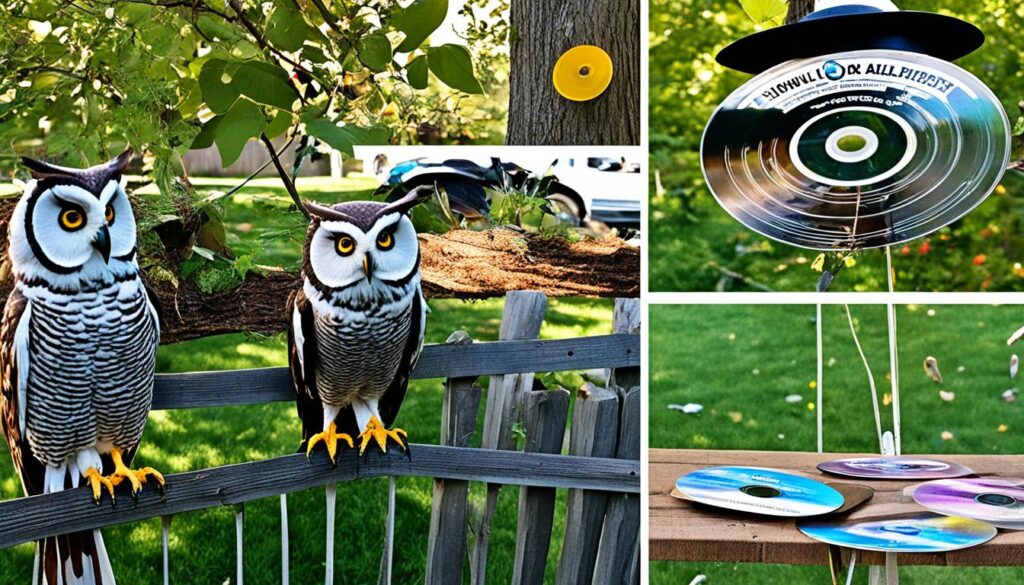
The Proven Smell Birds Hate
Home remedies might not work well to keep birds away. But, there’s a safe smell that really bothers them: methyl anthranilate (MA). This natural stuff comes from concord grapes. It makes birds’ noses and throats hurt, so they stay away.
Methyl Anthranilate: Nature’s Bird Repellent
Methyl anthranilate is a green and effective way to keep birds away. It’s a natural option that doesn’t harm birds, people, or the planet.
Easy-to-Use and Safe Bird Repellents
Products like Bird-Out make using methyl anthranilate easy and safe. They’re good for people, pets, and the earth. These safe bird control products work well and last a long time. They keep birds away without needing to be reapplied often.
“Methyl anthranilate is a game-changer in the world of bird control. It’s a natural, effective, and safe solution that sets it apart from other repellents on the market.”
Essential Oils and Spices as Bird Deterrents
Pigeons and other birds can be a problem for homeowners, causing damage and spreading diseases. Luckily, there are natural ways to keep them away, like using essential oils and spices. These smells can make an area unpleasant for birds, keeping them away.
Essential oils like peppermint, cedarwood, and lavender can be powerful bird repellents. Their strong smells are too much for birds, making them leave. Spices such as chili peppers, garlic, and cayenne pepper also work well, because they are very strong and irritating.
Grape Kool-Aid is another surprise way to keep birds away. Birds don’t like the artificial grape taste, so it’s a good homemade way to keep them off.
- Apple cider vinegar is a versatile natural bird repellent, its strong odor deterring birds from the area.
- Peppermint oil is a common essential oil used to repel pigeons and other birds.
- Chili peppers, with their active ingredient capsaicin, can effectively keep birds at a distance.
- Garlic, with its pungent “allicin” compound, is also effective in deterring birds.
These natural methods can work well, but you need to use them right. Make sure to keep the right amount and reapply after rain or when needed. Using too much might make birds get used to the smell, making them less effective over time.
“Utilizing scent repellents is a safe method to deter birds rather than using harmful means.”
For the best results in controlling bird problems, it’s best to call professional pigeon removal services. This ensures your bird control efforts work well over time.

What do birds hate?
Birds are fascinating but can be a nuisance in unwanted places. Knowing what they dislike helps in keeping them away. They avoid strong smells and shiny objects, among other things.
The smell of methyl anthranilate, a grape-based substance, is a strong deterrent. It uses a bird’s strong sense of smell to keep them away. Methyl anthranilate-based repellents are effective and long-lasting.
Birds also don’t like the idea of predators. Visual deterrents like decoys or shiny objects make them think there’s danger. Loud noises, mimicking predator calls, can also scare them off.
Home remedies like apple cider vinegar, chili peppers, and peppermint oil might help for a bit. But they often need to be reapplied and aren’t as effective as specialized repellents. The best solutions use birds’ natural dislikes for lasting results.
Understanding what birds hate helps in keeping them away. By using strong smells, visual, and sound deterrents, you can make your area less inviting to birds. This protects your property and keeps your community safe and bird-free.
Creating Homemade Bird Repellents
Some homeowners try making their own bird repellents. They use things like essential oils, vinegar, or spices. These items can keep birds away, but they don’t work well over time.
It’s hard to get the right amount of these ingredients and to keep applying them. Birds can get used to the smells and come back. Also, keeping up with these homemade repellents takes a lot of time and effort.
- Pest birds commonly attracted to homes include crows, pigeons, sparrows, robins, and starlings.
- Woodpeckers may drill into trees in search of insects, while birds require water and may eat pet food left outside.
- Nest removal using a long stick can discourage birds from nesting in unwanted areas.
DIY bird repellents can be a good and kind way to deal with birds. But, they need regular upkeep and work best for certain bird types. For better and lasting results, homeowners might look into commercial bird repellents or professional bird control services.

“A variety of DIY deterrents from visual scares to auditory solutions can effectively keep birds at bay.”
Knowing the limits of homemade bird repellents helps homeowners find the best natural or commercial solution. This way, they can keep their outdoor areas bird-free.
Effectiveness of Homemade Repellents
Homemade bird repellents might seem like a good way to save money. But, their effectiveness of DIY bird deterrents is often not great. They can be hard to apply right and need to be reapplied often to work.
Safety Considerations
Also, think about the safety of homemade bird repellents. Some things like peppermint oil and chili peppers can irritate your skin or cause other problems. It’s important to use them safely to protect people, pets, and the environment.
Local Regulations on Bird Control
Know the legal requirements for bird control in your area too. Some homemade methods might be banned or have rules to follow. It’s smart to check with local authorities to follow the law and avoid trouble.
Even though homemade repellents might look good, commercial ones like liquid bird repellents are often better. They use safe and legal stuff like methyl anthranilate to keep birds away.
“Methyl anthranilate (MA) is a natural substance found in concord grapes and it’s what gives foods and drinks their distinctive “grape” flavor and smell. MA is what’s used in food so it’s harmless to humans, pets, other animals, and the birds themselves.”
Commercial Liquid Bird Repellents
Commercial liquid bird repellents are a reliable and long-lasting choice compared to homemade remedies. They use ingredients like methyl anthranilate, which birds dislike. These commercial bird repellents are safe for people, pets, and the environment. They are EPA-registered, making them a smart choice for bird control.
Liquid bird deterrents like Avian Control cover a lot of ground. A gallon can treat about 4 acres. Avian Migrate can protect around 16,000 square feet or 1/3 of an acre. Avian Fog Force™ TR can keep birds away from 42,000 cubic feet for 30 days with just one can.
You’ll need to reapply Avian Control and Avian Migrate every 7-14 days, depending on the weather. Avian Fog Force™ TR offers long-lasting protection with little upkeep.
EPA-registered bird control products use methyl anthranilate, a grape seed extract that bothers birds. Customers love these products, saying they keep away starlings, geese, and crows. They work well on properties and farms.
When using commercial liquid bird repellents, follow the instructions closely. The solutions are mixed with water for different areas like lawns, hedges, and attics. These professional-grade bird control solutions help you manage bird problems responsibly.
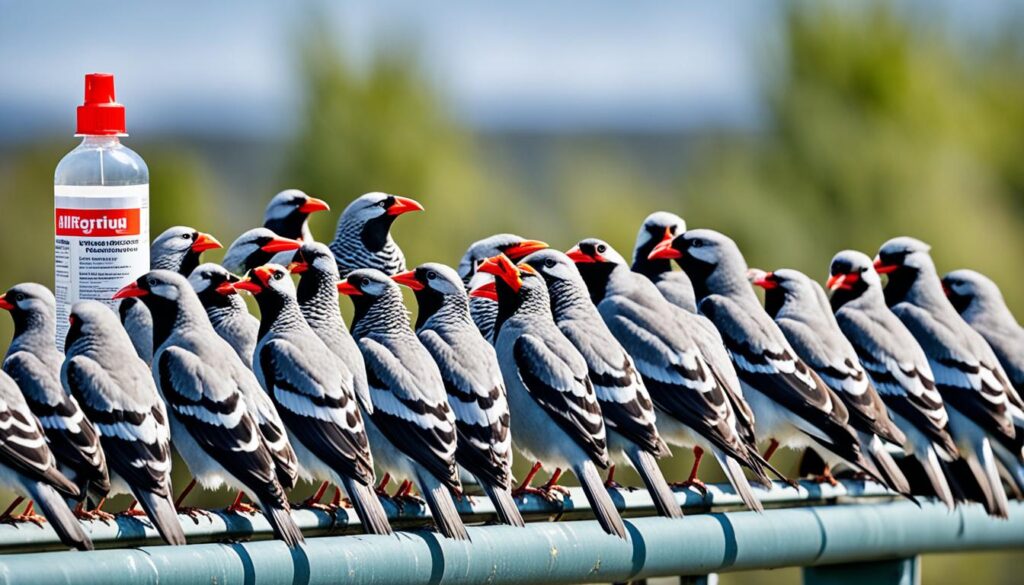
Predators as Natural Bird Deterrents
Using birds’ fear of predators is a great way to keep them away. Birds of prey like hawks and falcons can be used in falconry. This method scares off nuisance birds from certain areas. These birds don’t want to stay where they might be eaten, so they leave and don’t come back. It’s a humane way to control bird control.
Falconry and Birds of Prey
Falconry is an old way to use birds of prey to manage nuisance birds. It’s a natural way to keep birds away without using harsh methods. Just seeing a falcon or hawk makes smaller birds fly away. This makes falconry a great natural bird control method.
“Falconry is a centuries-old practice that harnesses the natural instincts of predatory birds to provide a safe and effective solution for managing problem bird populations.”
Adding using predators to scare birds to a bird control plan works well. It’s a green way to keep birds away without using chemicals or other bad methods.
Visual Deterrents
Visual deterrents are a strong way to keep birds away. They use birds’ keen eyesight to scare them off. This makes them a smart choice for both homes and businesses.
Anti-Bird Spikes: Deterring Perching and Nesting
Anti-bird spikes are a top choice for keeping birds away. These spikes are sharp and go on ledges and windowsills. They make it hard for birds to land or nest, keeping them away from certain spots.
Bird Netting: Creating Physical Barriers
Bird netting is another effective deterrent. It acts as a barrier, stopping birds from getting into areas like entryways or gardens. The netting looks almost invisible but keeps birds out effectively.
Visual deterrents can help for a while, but they might not work forever. For lasting results, combining different methods is best. This includes visual deterrents, exclusion products, and repellents suited for the bird type and problem size.
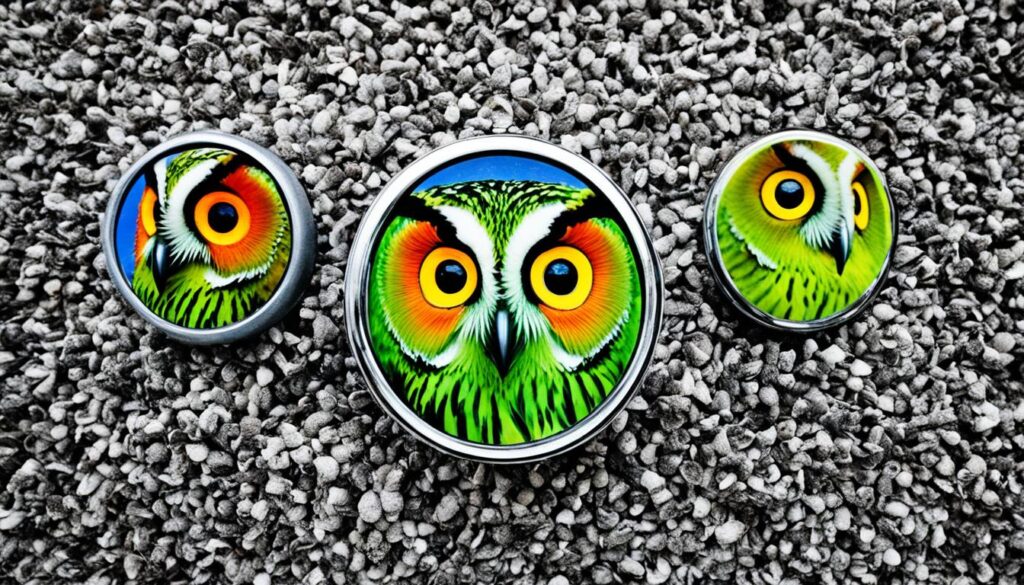
Using visual cues is a smart way to keep birds away. Homeowners and businesses can use anti-bird spikes, bird netting, or other methods. This makes it easy to manage bird issues effectively.
Eliminating Attractants for Birds
To keep birds away for good, we must tackle what draws them in. This means removing food sources like pet food, trash, or spilled grains. It also means eliminating nesting sites by sealing off places like ledges and gutters.
Removing Food Sources
Birds look for easy food, so keeping your area clean is key. Here are some important steps:
- Securely storing pet food and bird seed in airtight containers
- Regularly cleaning up any spilled grains or crumbs
- Ensuring trash cans have tight-fitting lids and are emptied frequently
- Removing any standing water sources, such as birdbaths or pet water bowls
Eliminating Nesting Areas
Birds like safe, enclosed spots for their nests. To stop them from nesting in your area, try these steps:
- Seal off access to ledges, gutters, and other potential nesting sites
- Install bird spikes or netting to create physical barriers
- Use visual deterrents, such as reflective objects or decoys, to make the area less appealing
By getting rid of bird attractants and using integrated bird control strategies, you can keep birds away for good.
Long-Term Solutions for Bird Control
Effective bird control is not just about quick fixes. It needs a long-term plan that uses different methods. By using a mix of strategies, you can keep birds away for good.
The AVIX Autonomic Laser bird repellent system is a great option. It’s up to 70% effective at keeping birds away. It covers a wide area and changes patterns to keep birds guessing.
Liquid bird repellents with natural ingredients like grape seed extract are also effective. They make birds uncomfortable and keep them away from treated areas.
- Use sound and visual deterrents like Bird Chase Super Sonic. It works for over 22 bird species and covers up to an acre.
- Try life-size Hawk Decoys and Holographic Flash Tape to scare away small birds from gardens and other areas.
- Install Bird B Gone Garden Netting and Anti-Bird Spikes to keep birds away from certain spots.
The best way to control birds long-term is to use a mix of methods. This includes getting rid of food and nests and using different deterrents. With this approach, you can keep birds away for good from your property or business.

“Successful bird control requires a multi-faceted approach that combines various deterrent methods, from scent-based repellents to visual and natural predator-based solutions.”
Conclusion
Understanding what birds hate is key to keeping them away for good. Home remedies and natural deterrents might help for a little while. But, the best solution is using methyl anthranilate-based repellents. These use birds’ strong sense of smell to keep them away.
Adding visual, physical, and natural predator-based methods makes a strong bird control plan. This approach tackles the main reasons birds come around in the first place. It also keeps them away without hurting them.
Using different bird repellent methods, like essential oils and smells birds dislike, can make your space less inviting. Also, removing food and nesting spots helps a lot. And, putting up visual deterrents in the right spots adds to the solution.
Effective bird control means using many different ways to keep them away. It also means thinking about their well-being and the planet. By using the latest research and proven methods, people can keep birds from causing problems. They can do this in a way that’s kind to birds and good for the earth.
FAQ
What do birds hate?
Birds don’t like strong smells, shiny objects, or the presence of predators. Knowing what they dislike helps in keeping them away from places we don’t want them.
Can birds smell?
Yes, birds have a strong sense of smell. They can smell a lot of things, like food and their own droppings. This helps them find food and take care of their nests.
What smells are birds attracted to?
Birds are drawn to smells related to their droppings and nests. They also like the smell of food. These smells help them find food and a place to nest.
Are home remedies effective for repelling birds?
Some people use home remedies like apple cider vinegar and essential oils to keep birds away. These can make birds move away because of their strong smells. But, they might not work well over time because it’s hard to keep the smell strong enough.
What is the proven smell that birds truly dislike?
The smell that really bothers birds is called methyl anthranilate (MA). It comes from concord grapes and makes birds’ noses and throats hurt. This makes them stay away. MA-based repellents are safe and work well for a long time.
Can essential oils and spices also act as bird deterrents?
Yes, some essential oils and spices like peppermint and cinnamon can keep birds away. But, they might not work as well as MA-based repellents.
Is it effective to create homemade bird repellents?
Some people try to make their own bird repellents with things from their kitchen. But, these homemade solutions often don’t work well or last long. It’s hard to keep the smell strong enough to keep birds away.
What are the advantages of using commercial liquid bird repellents?
Commercial bird repellents, like those from Avian, use effective ingredients like MA. They are safe for people, pets, and the environment. These products are more reliable and last longer than homemade ones.
Can the presence of predators deter birds?
Yes, having predators around can really scare birds away. Birds don’t like being near hawks or falcons because they might get eaten. This makes them leave and not come back, which is a good way to keep them away.
What other visual deterrents can be used to keep birds away?
Other than smells and natural deterrents, things like anti-bird spikes and bird netting can also work. These make it hard for birds to land or perch, keeping them away for a while.
How can I eliminate attractants to birds?
To keep birds away for good, you need to remove things that attract them. This means taking away food like pet food or spilled grains. Also, make sure they can’t nest in places like ledges or gutters.
What is the best approach for long-term bird control?
For long-term bird control, use a mix of different methods. This includes smells, visual deterrents, and natural predators. By getting rid of things that attract birds and using a good plan, you can keep them away for good.
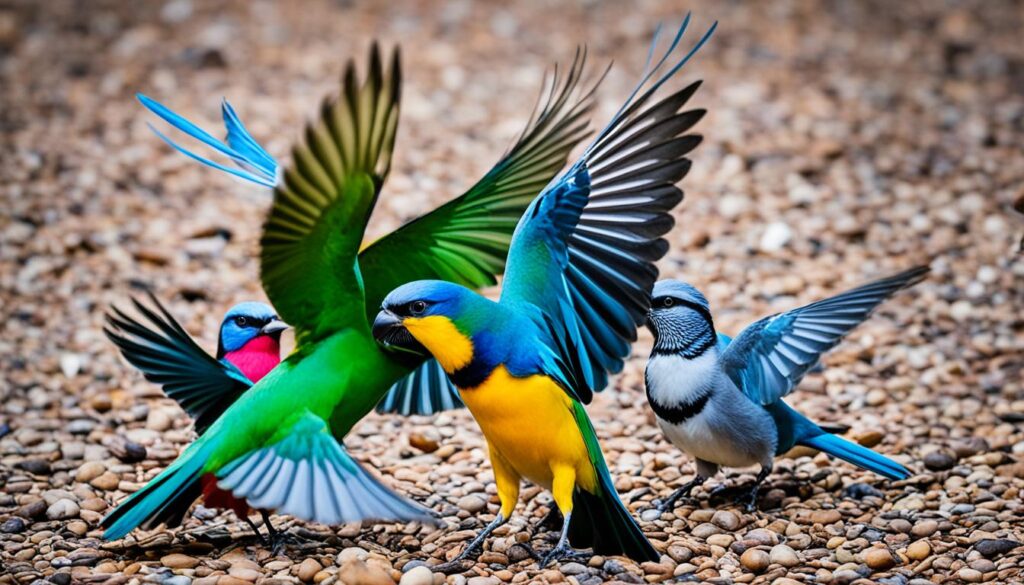
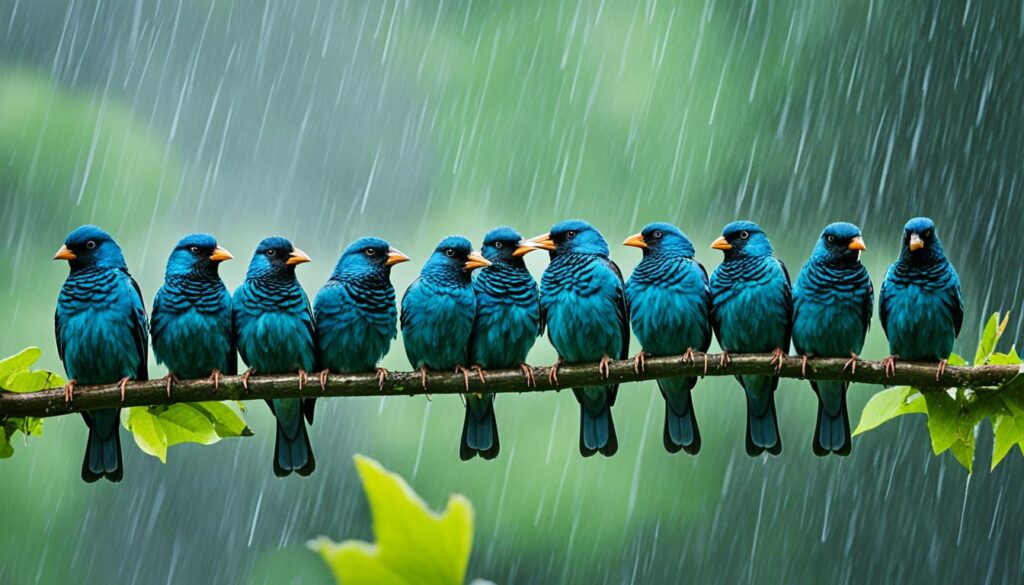
Thanks for your personal marvelous posting! I seriously enjoyed reading it, you can be a great author.I will make certain to bookmark your blog and will often come back in the foreseeable future.
I want to encourage continue your great posts, have a nice
morning! http://Boyarka-Inform.com/
безопасная сделка аккаунтов платформа для покупки аккаунтов
маркетплейс аккаунтов соцсетей купить аккаунт с прокачкой
перепродажа аккаунтов купить аккаунт
маркетплейс для реселлеров магазин аккаунтов социальных сетей
перепродажа аккаунтов биржа аккаунтов
маркетплейс для реселлеров маркетплейс аккаунтов соцсетей
биржа аккаунтов https://birzha-akkauntov-online.ru/
платформа для покупки аккаунтов https://marketplace-akkauntov-top.ru/
площадка для продажи аккаунтов magazin-akkauntov-online.ru/
маркетплейс аккаунтов продажа аккаунтов
маркетплейс аккаунтов безопасная сделка аккаунтов
аккаунт для рекламы аккаунты с балансом
покупка аккаунтов услуги по продаже аккаунтов
Buy accounts Sell accounts
Website for Buying Accounts Marketplace for Ready-Made Accounts
Website for Selling Accounts Accounts market
Online Account Store Account Trading Service
Account Selling Service Account Store
Sell accounts Marketplace for Ready-Made Accounts
Online Account Store Social media account marketplace
Profitable Account Sales Account Market
Account Store Account marketplace
Account Market Buy and Sell Accounts
account trading service account catalog
website for buying accounts sell pre-made account
sell pre-made account online account store
social media account marketplace accounts for sale
account market accounts marketplace
verified accounts for sale account trading
profitable account sales social media account marketplace
account trading service account catalog
account store verified accounts for sale
account buying service account exchange service
accounts marketplace https://socialaccountsshop.com
buy pre-made account https://buy-soc-accounts.org
buy pre-made account ready-made accounts for sale
verified accounts for sale account trading
find accounts for sale guaranteed accounts
website for selling accounts sell account
ready-made accounts for sale buy accounts
buy and sell accounts accounts market
gaming account marketplace account selling platform
account trading platform account store
online account store account store
account buying platform marketplace for ready-made accounts
account trading platform account trading platform
website for selling accounts accounts market
account exchange find accounts for sale
account trading buy pre-made account
accounts for sale profitable account sales
website for buying accounts account buying service
social media account marketplace accounts marketplace
verified accounts for sale https://accounts-marketplace.xyz
sell account https://buy-best-accounts.org
buy accounts https://social-accounts-marketplaces.live
sell account https://accounts-marketplace.live/
buy accounts https://social-accounts-marketplace.xyz
profitable account sales https://buy-accounts.space/
guaranteed accounts account market
account trading platform https://buy-accounts.live
account marketplace https://social-accounts-marketplace.live
accounts market https://accounts-marketplace.online
ready-made accounts for sale https://accounts-marketplace-best.pro
покупка аккаунтов https://akkaunty-na-prodazhu.pro
маркетплейс аккаунтов https://rynok-akkauntov.top/
маркетплейс аккаунтов https://kupit-akkaunt.xyz/
продать аккаунт https://akkaunt-magazin.online/
маркетплейс аккаунтов соцсетей купить аккаунт
маркетплейс аккаунтов https://kupit-akkaunty-market.xyz
купить аккаунт akkaunty-optom.live
биржа аккаунтов https://online-akkaunty-magazin.xyz
купить аккаунт магазины аккаунтов
биржа аккаунтов https://kupit-akkaunt.online/
buy a facebook account https://buy-adsaccounts.work
buy fb ad account https://buy-ad-accounts.click
buy facebook advertising accounts https://buy-ad-account.top
buy facebook advertising https://buy-ads-account.click/
buy facebook ad account buy facebook advertising
buy facebook accounts cheap buy facebook ads manager
buy facebook old accounts buy fb ads account
facebook ad accounts for sale https://buy-ad-account.click
В этой публикации мы сосредоточимся на интересных аспектах одной из самых актуальных тем современности. Совмещая факты и мнения экспертов, мы создадим полное представление о предмете, которое будет полезно как новичкам, так и тем, кто глубоко изучает вопрос.
Изучить вопрос глубже – https://medalkoblog.ru/
facebook account buy fb account for sale
buy verified google ads account google ads account seller
google ads agency account buy https://buy-ads-accounts.click
buying fb accounts https://buy-accounts.click/
buy aged google ads accounts buy google adwords accounts
google ads reseller https://ads-account-buy.work
buy google ads invoice account https://buy-ads-invoice-account.top
google ads account for sale buy google adwords account
buy verified google ads account https://buy-ads-agency-account.top
buy google ads accounts buy google ads invoice account